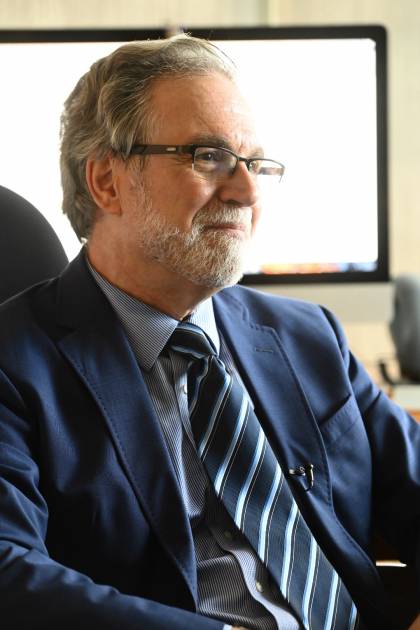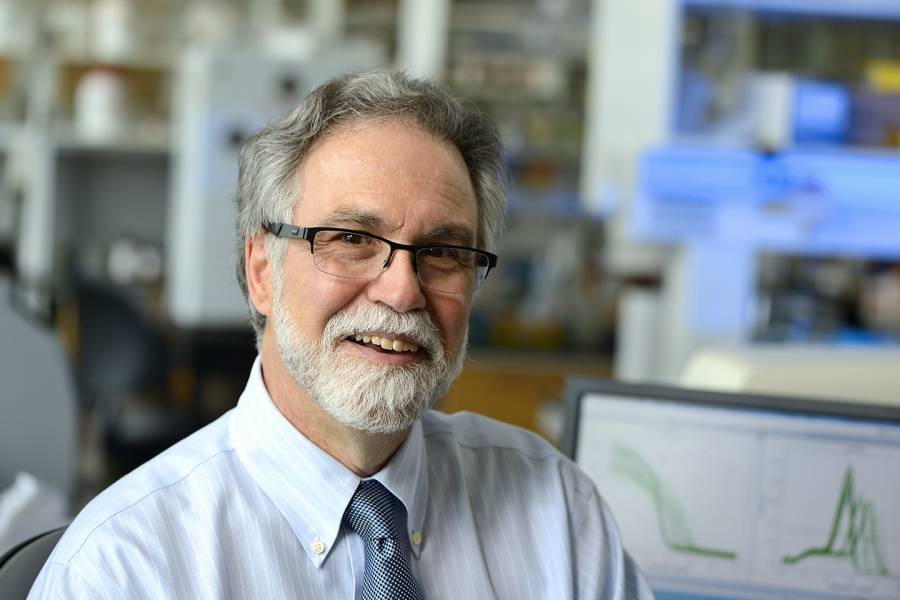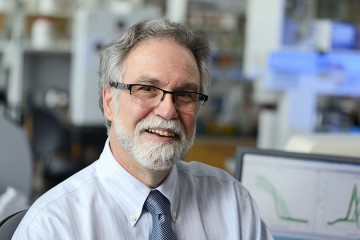Gregg L. Semenza, whose discoveries on how cells respond to low oxygen levels have the potential to result in treatments for a variety of illnesses, today was awarded the 2019 Nobel Prize in physiology or medicine by the Nobel Assembly at the Karolinska Institutet in Stockholm.
The academy recognized Semenza, the C. Michael Armstrong Professor of Medicine at the Johns Hopkins University School of Medicine, for his groundbreaking discovery of hypoxia-inducible factor 1, or HIF-1, the protein that switches genes on and off in cells in response to low oxygen levels. The discovery, along with Semenza's additional work clarifying the molecular mechanisms of oxygen regulation in cells, has far-reaching implications in understanding the impact of low oxygen levels in blood disorders, blinding eye diseases, cancer, diabetes, coronary artery disease, and other conditions.

Image caption: Gregg Semenza meets with a reporter early Monday after receiving word that he had won the Nobel Prize in Physiology or Medicine.
Image credit: Will Kirk / Johns Hopkins University
"I've been able to do what I've been able to do here at Hopkins, and I really don't believe that I would have accomplished this anywhere else," Semenza said Monday afternoon during a news conference on the university's East Baltimore campus. "That's why I've stayed here my whole career, because I think this is the greatest place to do research."
Semenza shares the award with William G. Kaelin Jr. and Sir Peter J. Ratcliffe. Kaelin, a professor of medicine at Harvard University and researcher at the Dana-Farber Cancer Institute, completed his specialist training in internal medicine and oncology at Johns Hopkins. Ratcliffe is a professor at University of Oxford and the Francis Crick Institute. The three researchers were honored "for their discoveries of how cells sense and adapt to oxygen availability," the Nobel Assembly wrote. They will share a cash prize of $913,000.
"The seminal discoveries by this year's Nobel laureates revealed the mechanism for one of life's most essential adaptive processes," the Nobel news release says. "They established the basis for our understanding of how oxygen levels affect cellular metabolism and physiological function. Their discoveries have also paved the way for promising new strategies to fight anemia, cancer, and many other diseases."
Considered the most prestigious science award in the world, the Nobel Prize has been awarded for achievements in physics, chemistry, physiology or medicine, literature, and peace since 1901 by the Nobel Foundation in Stockholm. Semenza, 63, will receive a medal, diploma, and cash award at a ceremony in Stockholm on Dec. 10.
"This is a momentous day for all of us at Johns Hopkins, and we are immensely proud," says Ronald J. Daniels, president of Johns Hopkins University. "Gregg's passion for discovery and the energy with which he pursues that passion exemplify Johns Hopkins' commitment to create new knowledge that helps make a better and more humane world. That hunger to always know more is what makes Gregg and our Johns Hopkins faculty so extraordinary."
Semenza is a member of the Institute for Cell Engineering, the McKusick-Nathans Institute of Genetic Medicine, and the Johns Hopkins Sidney Kimmel Comprehensive Cancer Center. His studies currently are focused on the role of HIF-1 in cancer, ischemia, and chronic lung disease, the most common causes of mortality in the U.S. population. His research paves the way for the development of drugs that could kill cancer cells by cutting off the supply of oxygen a tumor needs to grow. Semenza's work could also lead to medicines allowing tissues affected by conditions such as arterial disease to survive on low oxygen.
Video credit: Johns Hopkins Medicine
"The Nobel couldn't have gone to a more deserving researcher," says Landon King, executive vice dean for the Johns Hopkins University School of Medicine. "Gregg's work on hypoxia-inducible factor launched a new field of research, and has provided insights central to cancer, metabolism, and blood vessel development that are informing new approaches to therapy."
"There is no happier part of a dean's job than to help celebrate a faculty Nobel laureate," adds Paul B. Rothman, dean of the medical faculty and CEO of Johns Hopkins Medicine. "Gregg's career exemplifies the Johns Hopkins Medicine physician-scientist model: Gregg's groundbreaking basic research has been inspired largely by what he has seen in the clinic. The Johns Hopkins family couldn't be more pleased by this wonderful news."
Semenza was born in New York City and is the first of five children. His love of science developed thanks to his biology teacher at Sleepy Hollow High School in Westchester County, New York. He attended Harvard University for his bachelor's degree. While there, a family friend had a child born with Down syndrome, which inspired him to study pediatric genetics.
Semenza received his MD/PhD from the University of Pennsylvania, studying the genetic disorder beta thalassemia. He later went to Duke University to complete his internship and residency in pediatrics. He moved to Johns Hopkins in 1986 for a postdoctoral fellowship in medical genetics; met his wife, Laura Kasch-Semenza; and has been at Hopkins ever since. They have three children.
Semenza has authored more than 400 research articles and book chapters, which have been cited more than 130,000 times. He serves on the editorial boards of several scientific publications and is the deputy editor of The Journal of Clinical Investigation. He has received the American Heart Association Established Investigator Award, the American Cancer Society Research Professor Award, the Lefoulon-Delalande Scientific Grand Prize from the Institut de France, the Stanley J. Korsmeyer Award from the American Society for Clinical Investigation, the Wiley Prize in Biomedical Sciences, the Canada Gairdner International Award, and the Albert Lasker Basic Medical Research Award. He is an elected member of the Society for Pediatric Research, American Society for Clinical Investigation, Association of American Physicians, National Academy of Medicine, and National Academy of Sciences.
Semenza and Kaelin are the 28th and 29th people associated with Johns Hopkins as a faculty member, fellow, or graduate to win a Nobel Prize. Semenza joins three other Nobel laureates on the university's current faculty:
- Adam G. Riess, professor in the Department of Physics and Astronomy, won the prize in physics in 2011
- Peter Agre, 1974 School of Medicine graduate, former professor in the School of Medicine, and now director of the Malaria Research Institute in the Bloomberg School of Public Health, won the chemistry prize in 2003
- Carol Greider, professor and director of molecular biology and genetics in the School of Medicine, won 2009's physiology or medicine prize
Correction: The year in which Peter Agre won the Nobel Prize was misstated in an earlier version of this article. The Hub regrets the error.
Posted in Health, Science+Technology, University News










